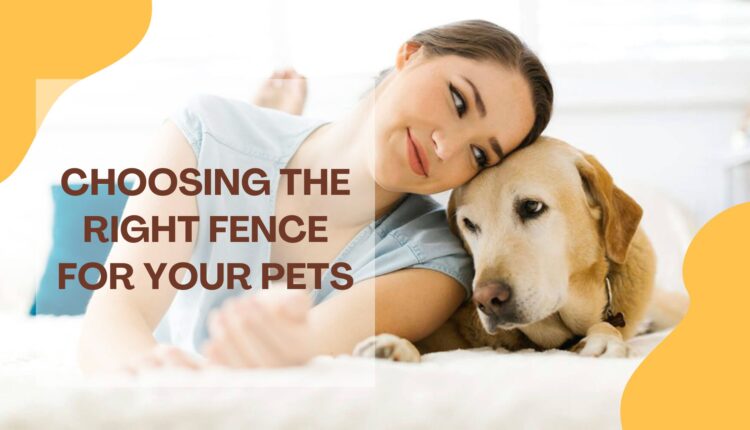Table of Contents
Playing and running outdoors is one way to keep your pets happy and healthy. Installing a fence around your yard keeps your pets safe as they play. Whether it’s a wood fence gate, modern fence, or wrought iron fence, there are several options you should consider for your pet fence. Here is what to consider when choosing the right fence for your pets:
Pet’s Size
The size of your pet determines whether it can pass through the gaps in your fence. If you have a large dog, it cannot pass through the openings of any fence you choose. Your dog might be able to jump over the fence, so you need to have a high fence installed. For smaller pets, you need a fence with smaller gaps to keep your pet from squeezing through and running away.
If your dog likes to chew on things, they may try to chew on the fence. If you choose a wooden fence, your dog might try chewing on it and may get splinters in their mouth. Consider using a sturdier material, such as aluminum or steel, which your dog cannot damage.
Yard Privacy and Visibility
Consider the level of visibility you want in your yard and how much visibility of what is outside you want your pet to have. If your pet gets distracted by outside noises and tends to bark, get a fence that reduces their exposure to outside stimuli. A wooden plank fence is an excellent option for reducing visibility to the outside of your yard.
If your pet enjoys observing its surroundings, a lattice fence can allow them to see outside the yard and remain protected. You can have a small hole cut into your solid fence if you prefer to have complete privacy while allowing your dog to view their surroundings.
Maintenance Requirements
Consider the general and long-term maintenance requirements of the material you choose for your fence. If you need help keeping up with the high-maintenance requirements of a particular fence type, consult your contractor on low-maintenance fence options. Understanding your fence’s maintenance requirements is also necessary to keep your fence in good condition for a long time.
A wood fence gate may require periodic staining to maintain its appearance. Vinyl and metal fences are low-maintenance options, only needing the occasional spray with your garden hose to keep dust from building up.
Local Regulations
Check your local and municipal regulations before installing a fence to choose a fence that meets all requirements. Your municipal area might have height restrictions and material guidelines for fences. Failure to comply with regulations could result in costly fines. You may also be required to remove or modify your fence if it does not comply with local codes.
Researching local regulations and consulting experts in your area helps you avoid the costly implications of installing the wrong fencing.
Pet’s Climbing Abilities
Some large dog breeds are good climbers who can easily climb the fence and run away. Your contractor can advise you on barriers to add to your chain link fence to make it less climbable.
Solid wood fence gates and panel fences are an ideal choice because they do not have footholds that your pet can use to climb. A vinyl fence is also a good option for pets that love to climb. While your fence might not be climbable if you have boosters along your fence, your pet can use them to jump over the fence. Remove any planters and bird baths you may have near your fence.
Fencing Material
If you have a big dog, it will easily get through a low-quality fence, so consider sturdier options like vinyl. A wood fence gate gives a classic aesthetic and can last for years with adequate maintenance.
Wood fences are one of the best options for privacy. Your fence contractor can advise you on which wood is naturally resistant to moisture and extreme temperatures. Vinyl and aluminum fences are also weather-resistant and offer durability. A chain-link fence provides visibility and security. Consult a contractor on which fence material suits your needs and budget preferences.
Installing a Wood Fence Gate
Choose the right wood fence gate to protect your pets and improve security in your home. Given the wide availability of choices like wood fence gates, vinyl, aluminum, and metal, it helps to consult a professional when choosing a fence for your pets.
See Also:



